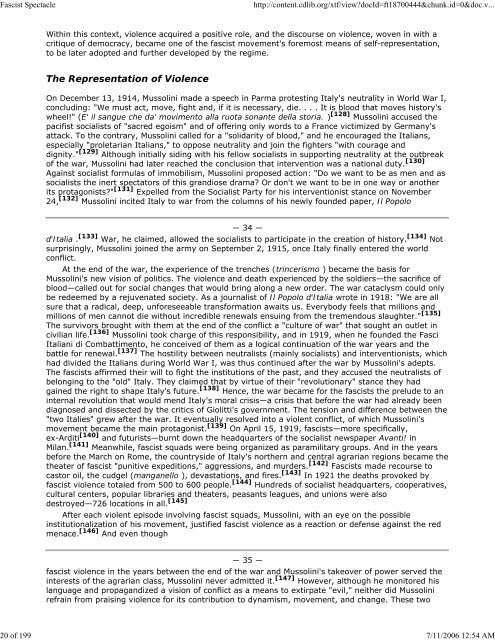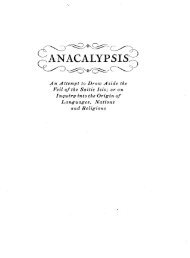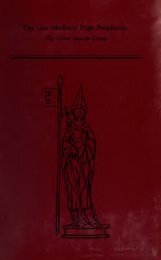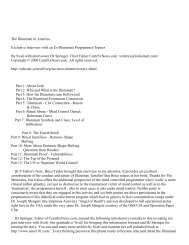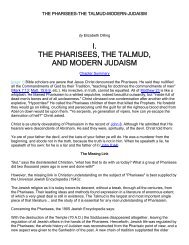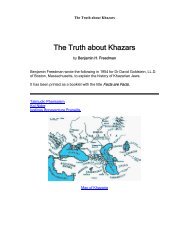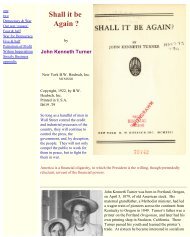You also want an ePaper? Increase the reach of your titles
YUMPU automatically turns print PDFs into web optimized ePapers that Google loves.
<strong>Fascist</strong> <strong>Spectacle</strong> http://content.cdlib.org/xtf/view?docId=ft18700444&chunk.id=0&doc.v...<br />
Within this context, violence acquired a positive role, and the discourse on violence, woven in with a<br />
critique of democracy, became one of the fascist movement's foremost means of self-representation,<br />
to be later adopted and further developed by the regime.<br />
The Representation of Violence<br />
On December 13, 1914, Mussolini made a speech in Parma protesting Italy's neutrality in World War I,<br />
concluding: "We must act, move, fight and, if it is necessary, die. . . . It is blood that moves history's<br />
wheel!" (E' il sangue che da' movimento alla ruota sonante della storia. ) [128] Mussolini accused the<br />
pacifist socialists of "sacred egoism" and of offering only words to a France victimized by Germany's<br />
attack. To the contrary, Mussolini called for a "solidarity of blood," and he encouraged the Italians,<br />
especially "proletarian Italians," to oppose neutrality and join the fighters "with courage and<br />
dignity." [129] Although initially siding with his fellow socialists in supporting neutrality at the outbreak<br />
of the war, Mussolini had later reached the conclusion that intervention was a national duty. [130]<br />
Against socialist formulas of immobilism, Mussolini proposed action: "Do we want to be as men and as<br />
socialists the inert spectators of this grandiose drama? Or don't we want to be in one way or another<br />
its protagonists?" [131] Expelled from the Socialist Party for his interventionist stance on November<br />
24, [132] Mussolini incited Italy to war from the columns of his newly founded paper, Il Popolo<br />
― 34 ―<br />
d'Italia . [133] War, he claimed, allowed the socialists to participate in the creation of history. [134] Not<br />
surprisingly, Mussolini joined the army on September 2, 1915, once Italy finally entered the world<br />
conflict.<br />
At the end of the war, the experience of the trenches (trincerismo ) became the basis for<br />
Mussolini's new vision of politics. The violence and death experienced by the soldiers—the sacrifice of<br />
blood—called out for social changes that would bring along a new order. The war cataclysm could only<br />
be redeemed by a rejuvenated society. As a journalist of Il Popolo d'Italia wrote in 1918: "We are all<br />
sure that a radical, deep, unforeseeable transformation awaits us. Everybody feels that millions and<br />
millions of men cannot die without incredible renewals ensuing from the tremendous slaughter." [135]<br />
The survivors brought with them at the end of the conflict a "culture of war" that sought an outlet in<br />
civilian life. [136] Mussolini took charge of this responsibility, and in 1919, when he founded the Fasci<br />
Italiani di Combattimento, he conceived of them as a logical continuation of the war years and the<br />
battle for renewal. [137] The hostility between neutralists (mainly socialists) and interventionists, which<br />
had divided the Italians during World War I, was thus continued after the war by Mussolini's adepts.<br />
The fascists affirmed their will to fight the institutions of the past, and they accused the neutralists of<br />
belonging to the "old" Italy. They claimed that by virtue of their "revolutionary" stance they had<br />
gained the right to shape Italy's future. [138] Hence, the war became for the fascists the prelude to an<br />
internal revolution that would mend Italy's moral crisis—a crisis that before the war had already been<br />
diagnosed and dissected by the critics of Giolitti's government. The tension and difference between the<br />
"two Italies" grew after the war. It eventually resolved into a violent conflict, of which Mussolini's<br />
movement became the main protagonist. [139] On April 15, 1919, fascists—more specifically,<br />
ex-Arditi [140] and futurists—burnt down the headquarters of the socialist newspaper Avanti! in<br />
Milan. [141] Meanwhile, fascist squads were being organized as paramilitary groups. And in the years<br />
before the March on Rome, the countryside of Italy's northern and central agrarian regions became the<br />
theater of fascist "punitive expeditions," aggressions, and murders. [142] <strong>Fascist</strong>s made recourse to<br />
castor oil, the cudgel (manganello ), devastations, and fires. [143] In 1921 the deaths provoked by<br />
fascist violence totaled from 500 to 600 people. [144] Hundreds of socialist headquarters, cooperatives,<br />
cultural centers, popular libraries and theaters, peasants leagues, and unions were also<br />
destroyed—726 locations in all. [145]<br />
After each violent episode involving fascist squads, Mussolini, with an eye on the possible<br />
institutionalization of his movement, justified fascist violence as a reaction or defense against the red<br />
menace. [146] And even though<br />
― 35 ―<br />
fascist violence in the years between the end of the war and Mussolini's takeover of power served the<br />
interests of the agrarian class, Mussolini never admitted it. [147] However, although he monitored his<br />
language and propagandized a vision of conflict as a means to extirpate "evil," neither did Mussolini<br />
refrain from praising violence for its contribution to dynamism, movement, and change. These two<br />
20 of 199 7/11/2006 12:54 AM


